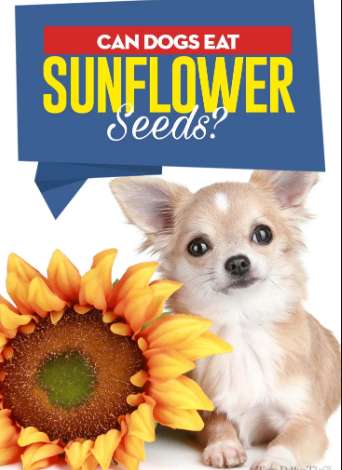Can Dogs Eat Sunflower Seeds? What You Need To Know

Dogs can eat sunflower seeds in moderation if they are shelled and unsalted, but they should not make these seeds their primary snack.
Sunflower seeds might seem like an unusual choice for a dog’s snack, but they can be a nutritious treat when given correctly. Packed with vitamins E and B, these seeds offer a boost in healthy fats that can contribute to a shiny coat and overall wellness.
Removing the shells is vital, as they can be difficult for dogs to digest and might cause intestinal blockage. Remember to keep the portion size small and use unsalted seeds to prevent unnecessary sodium intake. As with any new food, start with a small amount and observe your dog for any adverse reactions. Always consult a veterinarian if you need clarification on introducing new foods to your dog’s diet.
Contents
- 1 Sunflower Seeds Snacking: Safe For Canines?
- 2 Unshelled Conundrum: Shelled Vs. Unshelled Seeds
- 3 Nutritional Profile: What’s Inside A Sunflower Seed?
- 4 Preparation And Serving: Best Practices
- 5 Salt And Seasonings: Hidden Dangers For Pets
- 6 Allergies And Sensitivities: Not Every Dog Can Munch On Seeds
- 7 Integrating Seeds Into Canine Diets
- 8 Professional Vet Advice: When In Doubt, Ask An Expert
- 9 Real-life Stories: Pooch Owners Share Their Experiences
- 10 Conclusion
Sunflower Seeds Snacking: Safe For Canines?
Sunflower seeds may come to mind in the quest for healthy treats for our furry friends. Dogs find various human snacks irresistible, but caution is vital. This leads to the question: are these crunchy seeds safe for dogs? Let’s examine the nutritional benefits and potential risks to ensure your pup’s snacking remains a joyous affair.
Nutritional Benefits For Dogs
When appropriately offered, sunflower seeds can be a nutritious snack for dogs. They are packed with beneficial components that support canine health. Here’s how:
- Vitamin E: A powerful antioxidant that supports skin and coat health.
- B Vitamins: Aid in energy metabolism and maintain healthy nerves.
- Minerals: Magnesium and selenium are essential for bone health and immunity.
- Healthy Fats: Omega-6 fatty acids help sustain energy levels and boost overall vitality.
Potential Risks To Consider
Despite their nutritional advantages, there are certain risks to keep in mind before feeding sunflower seeds to your dog:
| Risk Factor | Description |
| Salt Content | Seeds often come salted, which can be harmful in excess. |
| Choking Hazard | Whole seeds can cause choking, especially in smaller breeds. |
| Intestinal Blockage | Hulls can obstruct digestion if not removed. |
| Caloric Density | High-fat content means moderation is crucial to prevent weight gain. |
| Allergic Reactions | Some dogs may be allergic to seeds or develop allergies over time. |
In summary, sunflower seeds can be beneficial for dogs if served correctly. Always choose unsalted, shelled seeds and offer them in moderation. Be on the lookout for any signs of an allergic reaction, and consult your vet beforehand. This helps keep your dog’s snacks both safe and satisfying.
Unshelled Conundrum: Shelled Vs. Unshelled Seeds
Dogs often love to munch on treats we enjoy, but what about sunflower seeds? Knowing the difference between shelled and unshelled seeds is essential for a pet owner. Each type has its considerations for your furry friend’s health and safety.
Digestibility Differences
Shelled sunflower seeds are the inner, edible part. They are easy for dogs to digest. Unshelled seeds have a fibrous husk that is hard for dogs to digest. If consumed in large quantities, this husk can cause an upset stomach or even an intestinal blockage.
- Shelled seeds: Eaten with no husk
- Unshelled seeds: Must be de-husked before eating
Giving your dog shelled seeds is the safer choice. It prevents them from ingesting the indigestible husks.
Choking Hazards
Unshelled seeds pose a choking risk to dogs, tiny breeds. The hard outer shell can get stuck in their throat. Shelled seeds, on the other hand, are smaller and less likely to cause choking.
| Seed Type | Size | Choking Risk |
| Unshelled | Larger | Higher |
| Shelled | Smaller | Lower |
Always supervise your dog when they’re enjoying sunflower seeds. Choose shelled seeds as a safer snack to keep the situation under control and your dog safe.
Nutritional Profile: What’s Inside A Sunflower Seed?
You might wonder about seeds when it comes to treats for your furry friend. Specifically, can dogs munch on sunflower seeds? Unshelled sunflower seeds can be a tasty snack for your pup in moderation. These seeds pack a punch of nutrients beneficial for both humans and canines. Let’s break down the nutritional goodness tucked inside these tiny seeds.
Essential Fatty Acids
Sunflower seeds are rich in essential fatty acids for your dog’s health. These include:
- Linoleic acid (an Omega-6 fatty acid) supports healthy skin and a shiny coat.
- Omega-3 fatty acids are beneficial for joints and immune response.
Vitamin E And Minerals
These little seeds are a powerhouse of Vitamin E, an antioxidant that keeps your dog’s immune system strong. Sunflower seeds also offer a trove of minerals crucial for health:
| Mineral | Benefits |
| Magnesium | It keeps bones strong and the heart rhythm steady. |
| Phosphorus | Aids in forming bones and teeth. |
| Selenium | It plays a role in preventing cell damage. |
| Zinc | Essential for immunity and skin health. |
Preparation And Serving: Best Practices
Do pets love snacks? Absolutely, and your furry friend might eye those sunflower seeds you enjoy. But before sharing your snacks, know how to prepare and serve them to dogs.
Proper Seed Preparation
Always remove the shells. Sunflower seed shells can be tough for dogs to digest and could lead to a choked throat.
Next, choose unsalted seeds. Salted ones are not dog-friendly. High salt intake could harm your dog.
No flavours or seasonings before serving. Dogs’ stomachs may not tolerate these well.
Lastly, ensure your sunflower seeds are fresh and free from mould, which could be toxic.
Appropriate Serving Sizes
Sunflower seeds can be a healthy treat for dogs in moderation. Quantity depends on the dog’s size. Use this list as a guide:
- Small Dogs: A pinch (5-10 seeds)
- Medium Dogs: 1 teaspoon (without the shell)
- Large Dogs: 1.5 teaspoons (shell-free)
Introduce seeds slowly to your dog’s diet. Watch for any unusual reactions. Not all dogs may respond well to even safe human foods. Consult a vet if you need clarification.
Remember, sunflower seeds are a treat, not a meal replacement. Include these tiny seeds within 10% of your dog’s daily food intake. Keep the balance to maintain your pet’s optimal health.
| Dog Size | Serving Size |
| Small | 5-10 seeds |
| Medium | One teaspoon |
| Large | 1.5 teaspoons |
Salt And Seasonings: Hidden Dangers For Pets
Dog owners often share snacks with their furry friends. However, not all human foods are safe for dogs. Hidden dangers lurk in snacks like sunflower seeds, especially when they contain salt and seasonings.
The Perils Of High Sodium
Salt may make sunflower seeds tasty, but too much harms dogs. Excessive salt intake can lead to dehydration, high blood pressure, and sodium ion poisoning, so it’s crucial to monitor a dog’s sodium consumption closely.
- Dehydration Signs: Thirst increase, dry mouth, and fatigue.
- Sodium Poisoning Signs: Vomiting, diarrhoea, tremors.
Toxic Seasonings To Avoid
Beyond salt, certain seasonings in sunflower seeds can be fatal to dogs. It’s vital to know which ones to avoid.
| Seasoning | Risks |
| Onion Powder | Anaemia, weakness, breathing issues |
| Garlic Powder | Digestive upset, red blood cell damage |
| Chocolate or Cocoa | Heart arrhythmias, seizures, death |
| Artificial Sweeteners (Xylitol) | Low blood sugar, liver failure |
For a dog’s health, always choose unsalted and unseasoned sunflower seeds. Recognize these dangers to keep your pet safe.
Allergies And Sensitivities: Not Every Dog Can Munch On Seeds
Like humans, dogs can have allergies and sensitivities to certain foods, including sunflower seeds. Knowing if your pup can safely enjoy these tasty seeds or should steer clear of them is crucial. Let’s explore how to identify an allergic reaction and what alternative snacks suit sensitive pups.
Recognizing Allergic Reactions
Observation is critical when introducing sunflower seeds to your dog’s diet. Allergic reactions can manifest in various ways. Look for signs such as itching, hives, swelling, or digestive upset. Contact your vet immediately if you notice any of these symptoms. Ensure you have the following checklist handy:
- Excessive itching or scratching
- Development of hives or rashes
- Facial or paw swelling
- Gastrointestinal issues, including diarrhoea or vomiting
- Respiratory problems, such as difficulty breathing
Alternative Snacks For Sensitive Pups
Don’t worry if sunflower seeds are off the menu. Plenty of safe and yummy snacks exist for sensitive dogs. Here’s a quick list of vet-recommended alternatives:
| Snack Type | Benefits |
| Carrot sticks | Great for teeth, low in calories |
| Apple slices (no seeds) | Fiber-rich, vitamins A & C |
| Plain, cooked pumpkin | Good for digestion, beta-carotene |
| Blueberries | Antioxidants, vitamins K & C |
Always introduce new snacks gradually and under supervision. Check for any signs of discomfort or allergic responses. Consult your vet to tailor a diet that suits your dog’s needs.
Integrating Seeds Into Canine Diets
Dogs often enjoy a variety of foods. Sunflower seeds are safe for them. But, they must be unsalted and shelled. Too many could upset their stomach. Let’s look at fun ways to add them to your dog’s diet.
Creative Ways To Include Sunflower Seeds
Sprinkling seeds on food adds crunch and nutrients. Here are some tips:
- Mix seeds in homemade dog treats.
- Stir a few into their regular kibble.
- Blend seeds into a dog-friendly smoothie.
Remember, introduce new foods slowly. Watch for any changes in their health.
Maintaining Dietary Balance
Balance is vital in a dog’s diet. Here’s how to keep it:
- Measure the seed amount. Use only a tiny teaspoon per meal.
- Monitor your dog’s overall diet. Ensure it’s dog-specific, primarily food.
- Consult with a vet before making any significant diet changes.
Seeds are a treat, not a meal. Keep this in mind to protect your dog’s health.
Professional Vet Advice: When In Doubt, Ask An Expert
We dog owners always want what’s best for our furry friends. This often leads us to wonder about the safety of certain foods, like sunflower seeds. While some snacks are safe in moderation, the importance of professional vet advice cannot be overstated. Before introducing new food to your dog’s diet, a veterinarian can provide the best guidance tailored to your pet’s needs and health. You should consult an expert to ensure your puppy stays happy and healthy.
Visiting Your Vet For Dietary Changes
Visiting a vet is crucial before making dietary changes. The vet will consider your dog’s:
- Age
- Weight
- Existing health conditions
A professional can spot any potential risks and advise on the correct serving size of sunflower seeds. Sunflower seeds can be beneficial, offering vitamins and fatty acids, yet they should be unsalted and shelled.
Reading Your Dog’s Responses To New Foods
After getting the green light from your vet, observe your dog when introducing sunflower seeds.
- Start with a small amount.
- Monitor for any changes in behaviour or digestion.
- Keep an eye out for signs of an allergy or intolerance.
Signs to watch for include:
| Behavior Changes | Digestive Issues | Allergic Reactions |
| Lethargy | Diarrhea | Skin rashes |
| Agitation | Vomiting | Excessive itching |
Stop feeding your dog the new food and consult your vet immediately if you notice any concerning symptoms.
Remember, safety comes first. A tailored diet with expert advice ensures your canine companion stays as healthy and vibrant as possible.
Exploring the world of canine diet is a journey full of surprises. Take sunflower seeds, for example. Many dog owners wonder, “Can dogs have these tasty treats, too?” Real-life stories from fellow pet parents provide insight into this question. Let’s dive into some of those narratives straight from the source.
Success Stories
Dog owners have witnessed some delightful outcomes when introducing sunflower seeds to their four-legged friends. Here’s what they’ve shared:
- Jake’s shiny coat turned heads at the park after his owner started mixing a few shelled, unsalted sunflower seeds into his meals.
- When given these seeds as an occasional treat, Bella’s energy levels soared, much to her owner’s joy
.
- When her diet included a small amount of sunflower seeds, Lola’s digestion improved, and she had fewer tummy troubles.
Lessons Learned From Incidents
While some experiences were positive, others served as essential lessons. Here are a few cautionary tales:
| Dog’s Name | Incident | Lesson Learned |
| Max | Chocking on a whole seed | Permanently remove shells and crush seeds |
| Sophie | Allergic reaction | Introduce new foods gradually and monitor |
| Rex | Weight gain | Only give seeds in moderation |
Remember, these stories underscore the importance of being mindful of your dog’s diet. Consult with your vet before making any changes.
Conclusion
As we wrap up, it’s clear that sunflower seeds can be a nutritious snack for your canine companion when shelled and given in moderation. Always prioritize your pet’s health and consult a vet before introducing new foods. Keep those tails wagging with safe, tasty treats!




